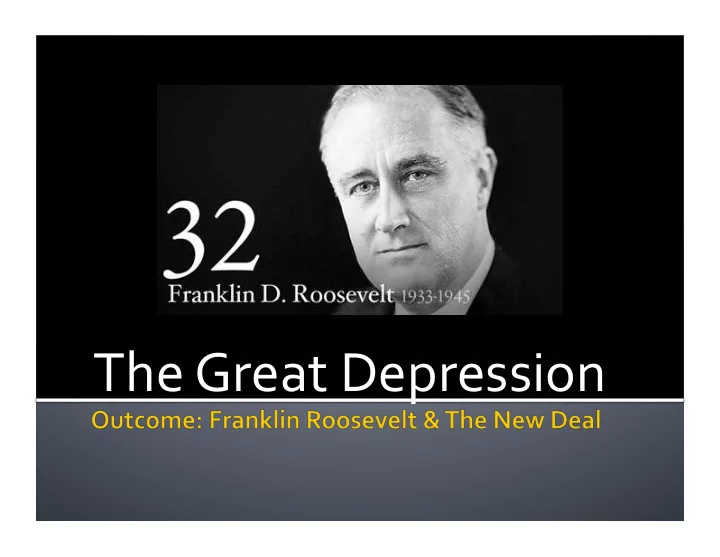

The ¡Great ¡Depression ¡
1. Background ¡ a. Youth ¡and ¡Personal ¡Life ¡ i. Born ¡into ¡ wealthy ¡New ¡York ¡family ¡ ii. Spoiled; ¡ only ¡child , ¡“doted ¡on” ¡ iii. Harvard ¡Educated ¡-‑-‑-‑> ¡history ¡& ¡law ¡( athlete ) ¡ iv. Married ¡ Eleanor ¡Roosevelt ¡( influential ¡1 st ¡Lady); ¡6 ¡kids ¡ v. 1921 ¡– ¡age ¡39 ¡-‑-‑-‑> ¡stricken ¡w/ polio ¡(changed ¡his ¡life) ¡
b. Long ¡Political ¡Career ¡ i. 1910 ¡– ¡NY ¡ Senate ; ¡1912 ¡– ¡Asst. ¡Secr. ¡Of ¡ U.S. ¡Navy ¡ ii. 1920 ¡– ¡ Vice ¡Presidential ¡candidate ¡-‑-‑> ¡lost ¡to ¡ Harding /Coolidge ¡ iii. 1928-‑1932 ¡-‑-‑-‑> ¡served ¡as ¡ Governor ¡of ¡NY ¡ iv. 1932 ¡-‑-‑-‑> ¡defeats ¡ Herbert ¡Hoover ¡for ¡Presidency ¡
2. Presidency ¡ Character: ¡-‑-‑-‑> ¡energetic, ¡compassionate, ¡confident, ¡feared ¡no ¡one ¡ a. Broke ¡Traditions ¡ b. i. Created ¡a ¡“ Brain ¡Trust ” ¡of ¡experts ¡to ¡advise ¡him ¡(beyond ¡his ¡ cabinet ) ¡ ii. Appointed ¡1 st ¡ woman ¡to ¡his ¡cabinet: ¡Frances ¡ Perkins ¡ iii. Called ¡Congress ¡into ¡Emergency ¡ Special ¡Session ¡ iv. Ordered ¡a ¡Nation ¡ Bank ¡Holiday ¡(goal: ¡to ¡inspect ¡the ¡banks) ¡ v. Elected ¡President ¡ 4 ¡times ¡ vi. Used ¡ media ¡to ¡fullest ¡-‑-‑-‑> ¡“ Fireside ¡Chats” ¡
c. Personal ¡Attitude ¡Toward ¡Depression ¡and ¡The ¡Role ¡of ¡Government ¡ i. Federal ¡Government ¡has ¡a ¡ responsibility ¡to ¡help ¡-‑-‑-‑> ¡ directly ¡ if ¡need ¡be ¡ ii. Ignored ¡Traditional ¡Conservative ¡Approach ¡of: ¡ 1. Maintaining ¡a ¡ balanced ¡budget ¡ 2. Cutting ¡taxes ¡& ¡ waiting ¡for ¡recovery ¡
iii. Adopts ¡theory ¡of ¡economist ¡John ¡Maynard ¡ Keynes ¡who ¡suggested: ¡ 1. Increasing ¡government ¡ spending ; ¡ deficit ¡spend ¡if ¡necessary ¡ 2. Cutting ¡taxes ¡ 3. Creating ¡government ¡ job ¡programs ¡ 4. If ¡workers ¡have ¡$, ¡they ¡will ¡ spend ¡it, ¡priming ¡the ¡economic ¡pump ¡
Actions ¡& ¡Policies ¡-‑-‑-‑> ¡New ¡Deal ¡Program ¡(3 ¡part ¡Public ¡Assistance) ¡ d. i. Relief ¡($, ¡food, ¡shelter; ¡temporary ¡ charity ) ¡ 1. Ex. ¡ CCC , ¡FERA, ¡ WPA ¡ ii. Recovery ¡(programs ¡aimed ¡at ¡industrial ¡& ¡agricultural ¡recovery, ¡jobs) ¡ 1. Ex. ¡ AAA , ¡ NRIA , ¡PWA ¡ iii. Reform ¡(lasting ¡changes; ¡built ¡in ¡safeguards) ¡ 1. Ex. ¡ FDIC , ¡NLRB, ¡ SEC , ¡Social ¡Security ¡ e. 1933 ¡– ¡21 st ¡Amendment ¡-‑-‑-‑> ¡repealed ¡prohibition ¡
3. FDR’s ¡Critics ¡ a. Some ¡said ¡he ¡was ¡too ¡liberal ¡ i. Conservatives ¡called ¡him ¡a ¡radical ¡ socialist ¡ ii. Gave ¡government ¡too ¡much ¡control ¡of ¡the ¡ economy ¡(TVA, ¡jobs, ¡etc) ¡
b. Demagogues ¡said ¡he ¡moved ¡too ¡slowly ¡ i. Huey ¡Long ¡(King ¡Fish) ¡“Share ¡the ¡Wealth” ¡ 1. Louisiana ¡ Senator ¡& ¡ Governor ¡ 2. Guaranteed ¡every ¡family ¡a ¡$ 5,000 ¡yearly ¡income ¡ 3. Gov’t ¡would ¡tax ¡the ¡ rich ¡and ¡seize ¡estates ¡over ¡$ 50M ¡ 4. Assassinated ¡before ¡he ¡could ¡run ¡for ¡president ¡
ii. Charles ¡Coughlin ¡“Radio ¡Priest” ¡ 1. Supported ¡FDR ¡at ¡first ¡and ¡then ¡grew ¡ impatient ¡with ¡New ¡Deal ¡ 2. Offered ¡an ¡annual ¡living ¡ wage ; ¡wanted ¡banks ¡ nationalized ¡ 3. Blamed ¡the ¡ Jews ¡-‑-‑-‑> ¡BAD! ¡
iii. Dr. ¡Francis ¡Townsend ¡-‑-‑-‑> ¡focused ¡on ¡program ¡for ¡the ¡elderly ¡ 1. Plan ¡would ¡give ¡people ¡60 ¡and ¡older ¡$ 200 ¡a ¡month ; ¡could ¡not ¡save ¡ 2. Ideas ¡led ¡to ¡ Social ¡Security ¡
c. Supreme ¡Court ¡said ¡he ¡abused ¡power ¡ i. Declared ¡many ¡“Recovery” ¡programs ¡ unconstitutional ¡ ii. Conservative ¡Group ¡(1930-‑36); ¡FDR ¡called ¡them ¡“The ¡9 ¡ Old ¡Men” ¡ iii. Court ¡ Packing ¡Affair ¡-‑-‑> ¡FDR’s ¡attempt ¡to ¡ liberalize ¡the ¡Court ¡(1937) ¡ iv. FDR ¡loses ¡the ¡ battle , ¡but ¡wins ¡the ¡ war ¡– ¡retirements ¡occur ¡
4. FDR’s ¡Long-‑Term ¡Impact ¡ Deficit ¡Spending ¡became ¡ normal ¡procedure ¡at ¡Federal ¡level ¡(debt ¡today?) ¡ a. Government’s ¡role ¡in ¡regulating ¡the ¡ economy ¡remains ¡strong ¡ b. Reform ¡programs ¡still ¡exist ¡(ex. ¡ FDIC , ¡ SEC , ¡Social ¡Security) ¡ c. Federal ¡government ¡remains ¡a ¡big ¡and ¡growing ¡ employer ¡ d. 22 nd ¡Amendment ¡(1951) ¡-‑-‑-‑> ¡ 2 ¡term ¡limit ¡for ¡presidency ¡ e. Democratic ¡party ¡membership ¡ increased ¡ f.
5. World ¡Solutions ¡to ¡the ¡Depression ¡ a. Dictators ¡offered ¡prosperity ¡in ¡exchange ¡for ¡power ¡ i. Germany: ¡ Hitler ¡-‑-‑-‑> ¡Nazism ¡ ii. Italy: ¡Mussolini ¡-‑-‑-‑> ¡ Fascism ¡ iii. Soviet ¡Union ¡-‑-‑-‑> ¡Stalin ¡-‑-‑-‑> ¡ communism ¡
b. The ¡Stage ¡is ¡Set ¡for ¡World ¡War ¡II ¡
Recommend
More recommend